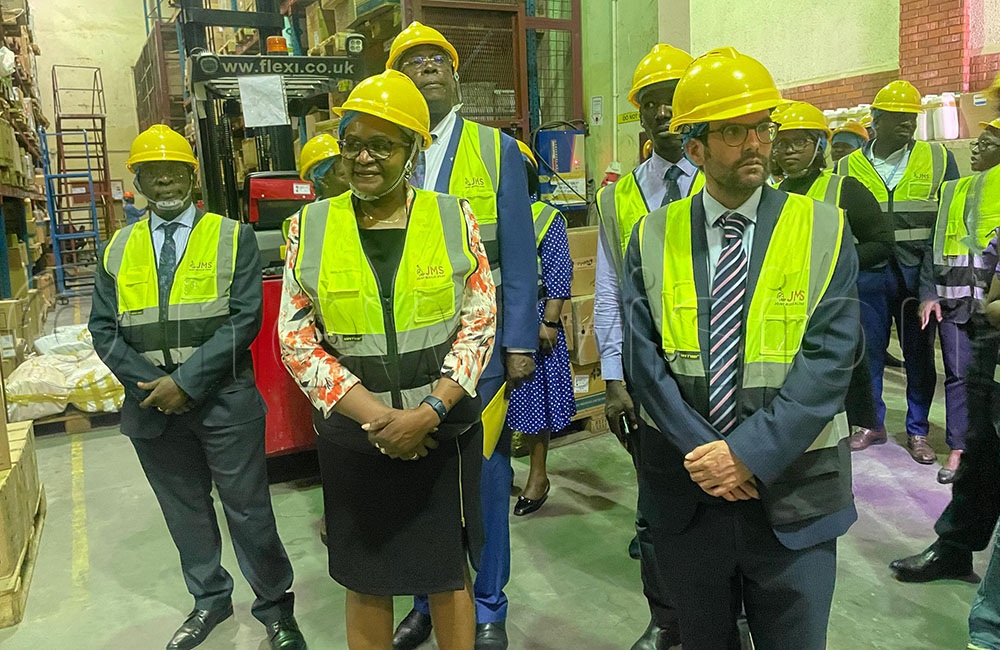UNFPA, UK govt donate sh7.4b to JMS to ease medical supply shortages
“Following the recent stop-work order, commodities previously procured by USAID, valued at sh7.4 billion, have remained in our warehouse without distribution. This posed a serious risk to the continuity of services and access for communities,” Baguma said.
(L-R) Dr. Bildard Baguma, the Executive Director Joint Medical Stores (JMS), Dr. Joseph Okware, the Acting Director of General Services at the Ministry of Health, Gift Malunga UNFPA’s Country Representative, among other officials.
By Ibrahim Ruhweza
Journalists @New Vision
KAMPALA - Thousands of women and girls across Uganda are set to benefit from lifesaving reproductive health commodities following a sh7.4 billion donation from the United Nations Population Fund (UNFPA) and the British government’s Foreign, Commonwealth and Development Office (FCDO).
The donation comes at a critical time when Uganda’s health system has been grappling with severe shortages of essential medical supplies.
These shortages have been worsened by funding disruptions caused by recent executive orders issued by U.S. President Donald Trump, which froze foreign aid and disrupted USAID-funded reproductive health programmes.
Project
Speaking at the launch held at the Joint Medical Store (JMS) headquarters in Nsambya, Kampala, Dr Bildard Baguma, the executive director of JMS, hailed the initiative, dubbed the Empowering Women to Achieve Better Reproductive Health Outcomes project, as a timely intervention to avert a looming crisis.
“Following the recent stop-work order, commodities previously procured by USAID, valued at sh7.4 billion, have remained in our warehouse without distribution. This posed a serious risk to the continuity of services and access for communities,” Baguma said.
The nine-month project, running from July 2025 to March 2026, will ensure that reproductive health supplies finally reach private-not-for-profit (PNFP) facilities, key distribution hubs, and condom-access points across Kampala, Wakiso and Mukono.
According to Baguma, the Alternative Distribution System (ADS), established in 2019 through a partnership between JMS, UNFPA and the Ministry of Health, has already transformed Uganda’s supply chain. Through the ADS, JMS has successfully delivered commodities to over one million women and girls across 320 accredited facilities.
“With this funding, we are ensuring these products finally reach the women and families who need them most,” Baguma added, noting that the project will also enhance real-time monitoring of stock levels and improve last-mile delivery.
Commitment
Gift Malunga, UNFPA’s country representative, underscored the significance of the donation, describing family planning supplies as central to Uganda’s social and economic development.
“Without this timely support, these lifesaving commodities risked remaining in warehouses, unavailable to the women and girls who need them most,” Malunga said. “This initiative ensures continuity of care and protects the health and future of Ugandan families.”
She stressed that empowering women to plan their families leads to better education outcomes, greater economic participation and reduced poverty. Malunga also revealed that the EMPOWER project aligns with Uganda’s National Development Plan IV (NDP IV), which seeks to reduce the unmet need for family planning from 24% to 10% by 2030.
The Trump factor: how US policies disrupted Uganda’s health sector
The need for alternative funding became urgent after President Donald Trump’s executive orders froze billions in U.S. foreign aid, including support for reproductive health programmes in Uganda.
On January 20, 2025, Trump signed an order halting foreign development assistance for 90 days pending a policy review. Shortly after, the U.S. State Department issued stop-work orders on several USAID-funded health projects, affecting programmes supporting family planning, HIV prevention and maternal health.
In addition, Trump reinstated and expanded the Global Gag Rule, blocking funding to any organisation associated with abortion-related services even when those services were financed with non-U.S. funds.
For Uganda, where USAID has been one of the largest funders of reproductive health, the effects were immediate and severe.
Thousands of clinics faced shortages of contraceptives, HIV test kits and essential medicines, and many women in both urban and rural areas reported unintended pregnancies due to lack of access to family planning services.
Health experts warn that these cuts could reverse years of progress made under programmes like PEPFAR and USAID’s family planning initiatives, leaving vulnerable populations at risk.
Against this backdrop, the UNFPA–FCDO partnership has emerged as a crucial lifeline for Uganda’s reproductive health sector. The donation ensures that supplies which have been stuck in warehouses for months will now be distributed to facilities where they are needed most.
“This is not just about distributing products; it is about safeguarding the reproductive health and rights of Ugandan women and girls,” Baguma emphasised.
“When women have access to these essential supplies, we reduce unplanned pregnancies, strengthen maternal health and contribute to Uganda’s broader development goals.”
According to UNFPA, the distribution exercise is already underway and will cover more than 1,100 condom-access points, with special focus on vulnerable and high-risk groups.
“When women and girls are empowered with choices, families thrive, communities prosper, and nations grow stronger,” Malunga noted.
Philip Elks, team leader for humanitarian and human development at the British High Commission, said the UK was proud to support Uganda’s health sector, adding: “Every mother has the right to access quality medical care, and that is the key reason we are funding the distribution of these medical supplies.”
Dr Joseph Okware, the acting director of general services at the Ministry of Health, welcomed the initiative, saying child mortality, particularly in rural districts, remains a major challenge.
“With this support, we expect a significant reduction in preventable deaths,” he said, commending the partnership as a humanitarian act that would boost service delivery nationwide.
